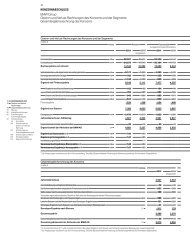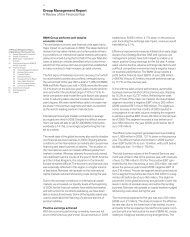Sustainable Value Report 2001/2002 - BMW Group
Sustainable Value Report 2001/2002 - BMW Group
Sustainable Value Report 2001/2002 - BMW Group
You also want an ePaper? Increase the reach of your titles
YUMPU automatically turns print PDFs into web optimized ePapers that Google loves.
Share of anthropogenic CO 2 emissions in<br />
Germany, 1999<br />
Carbon dioxide (CO 2)<br />
859 million tons<br />
Hydrogen service station near Munich airport<br />
<strong>BMW</strong> <strong>Group</strong> has focused on in its sustainable<br />
mobility concept. But reality paints a different<br />
picture: The infrastructure problems related to<br />
the introduction of alternative fuels are immense.<br />
Although there are nearly 15,000 service<br />
stations in Germany alone, hydrogen fuel is only<br />
commercially available at one station located<br />
near Munich airport.This service point was set<br />
up with support from <strong>BMW</strong>. A self-service<br />
hydrogen station for fleet vehicles is currently<br />
in operation in Hamburg.<br />
Traffic networks: Untangling the knots<br />
Dealing with increasing traffic volume requires<br />
a more efficient infrastructure with more effective<br />
control of traffic flow. <strong>BMW</strong> operates its own<br />
mobility research institute in Berlin and supports<br />
the development of new technologies based<br />
on the principle of sustained mobility through<br />
traffic control.<br />
Model policies: First series of hydrogenpowered<br />
cars<br />
Changes in anthropogenic CO 2 emissions in<br />
Germany since 1990, in million tons<br />
Advancements in environmental protection<br />
and achieving commercial success are by no<br />
means mutually exclusive concepts. <strong>BMW</strong> <strong>Group</strong><br />
model policies are aimed at serving both of<br />
these objectives by consistently implementing<br />
a sustainable mobility concept. In the coming<br />
years, the company will focus on the development<br />
of advanced technologies designed to<br />
reduce average fuel consumption. Alternative<br />
drive concepts will be engineered for series<br />
production vehicles, and new market segments<br />
will be explored with innovative models introduced<br />
at the lower end of the market.<br />
The latest <strong>BMW</strong> 3-series compact car with<br />
VALVETRONIC technology introduced a new<br />
era in gasoline powered engines. In the future,<br />
<strong>BMW</strong> engineers will continue to develop lightweight,<br />
low consumption vehicles.The <strong>BMW</strong><br />
<strong>Group</strong> has already announced plans for a new,<br />
hydrogen-powered, <strong>BMW</strong> 7-series car.<br />
1990 1999<br />
Cars and motorcycles 13% 104 115 (+ 11%)<br />
Commercial vehicles/buses 7% 46 59 (+ 28%)<br />
Other means of transport 2% 22 17 (- 23%)<br />
Traffic sector total 172 191 (+ 11%)<br />
Households<br />
and small consumers<br />
Power station and district<br />
20% 204 171 (- 16%)<br />
heating power stations 38% 397 326 (- 18%)<br />
Industry 20% 241 170 (- 29%)<br />
Total CO 2 1,014 859 (- 15%)<br />
9



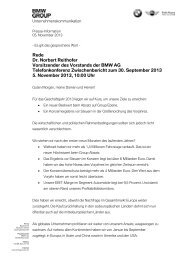
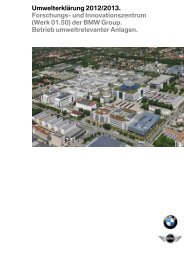

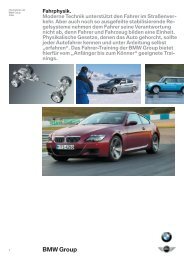
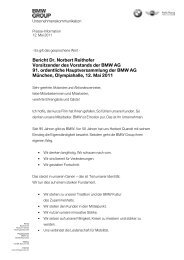
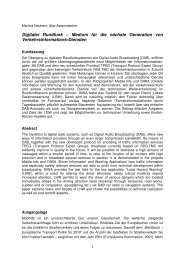
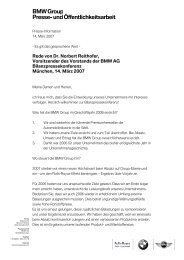
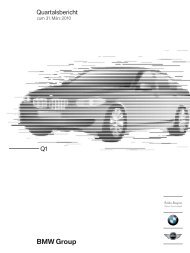
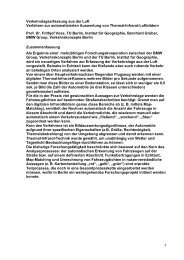
![Vollständiger Bericht [PDF] - BMW Group](https://img.yumpu.com/20706531/1/190x238/vollstandiger-bericht-pdf-bmw-group.jpg?quality=85)



